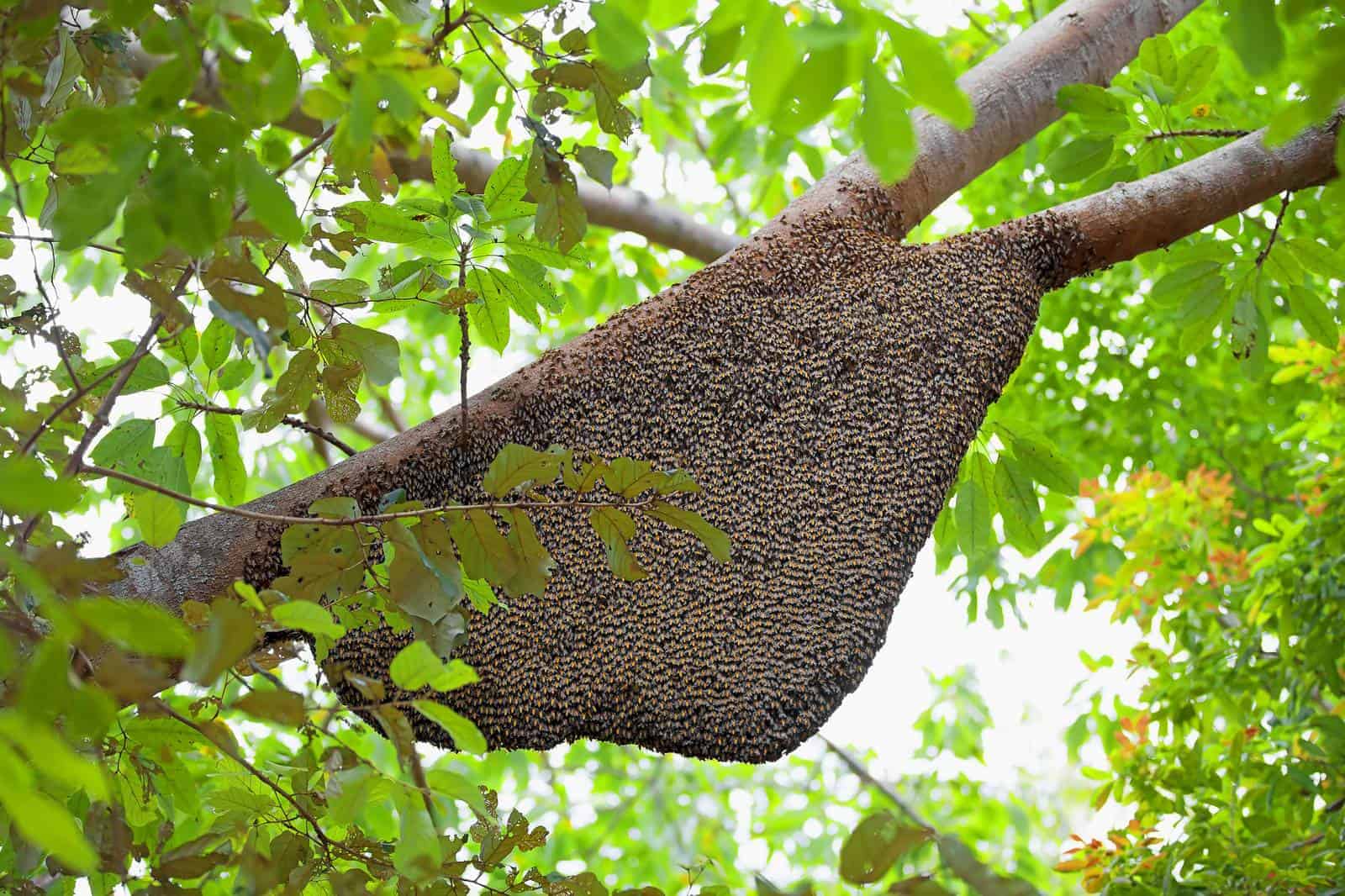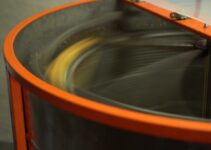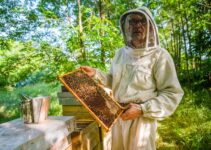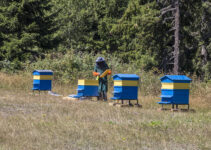Most diligent beekeepers love to harvest the honey from their bees regularly. Maybe this is because they want to sell it and earn hard earned cash, or maybe they just want some home produced honey for their family and friends. But this is not the case for all beekeepers. Some of them may be in this simply for the love of bees and helping out an endangered species! Some others may have gotten busy in life and simply not gotten around to harvesting their liquid gold. Whatever the reason, what will happen if you don’t harvest the honey in your beehives? This is the burning question we will answer today!!
If you don’t harvest your honey, the colony will quickly outgrow its hive. Not only because the excess honey will be taking up valuable space in the hive, but also because this abundance of food for the colony will lead to an explosion in population. When this happens, the bees will probably get cramped and decide that the hive is way too small for them and will begin to swarm in search of other places to live.
It might seem cruel to collect honey from bees because, after all, they eat that stuff. However, if you are a beekeeper, collecting the honey from the hives will always be a good choice for you because it allows you to make sure that your bees don’t end up outgrowing their hive and that they won’t have to try to look for another place to live, which can be detrimental to your house and for the surrounding community.
What happens if honey is not harvested?
More and more people are turning to beekeeping and the joys it brings! But all beekeepers are not created equal! There will be some people who actually like beekeeping because it can be profitable when you sell their surplus stocks of honey. Then again, there are some people who don’t do it for the honey but simply do it because they love beekeeping and that they believe that it is something that is fun and fulfilling to do. That’s why these people don’t always collect honey from their hives.
Another thing that may keep people from wanting to collect honey from their beehives is that they believe that doing so is cruel. After all, bees actually eat the honey that they produce. So, if you were to take the honey away from the bees, that would be similar to stealing their food. And bees need plenty of food during the winters because they can’t go out to search for pollen and nectar when the weather is too cold for them.
So, in such cases, the honey in the beehives goes untouched because it isn’t harvested by the beekeepers. However, what happens if you don’t end up harvesting the honey that your bees collect? Is there something bad that would happen if the honey goes untouched?
Yes, in fact, it can be bad for you if you don’t harvest your bee’s honey. The reason why this can be bad for you is that there will be an excessive buildup of honey in the hive, way more than even a busy colony can consume (bees are not gluttons, you know!!). Remember that honey isn’t the only thing that bees eat as they also consume pollen and nectar. So, if you don’t harvest the honey while the bees still collect and eat pollen and nectar, your beehive will turn into a 24 hour McDonalds for bees! But a quiet one where loads of food is left over 🙂 (see what I did there?)
On top of this, when there is a surplus of food in the hive, the bees will be able to quickly multiply and reproduce to the point that they will more than likely outgrow their hive. And when they outgrow their hive, the hive becomes too tight and cramped for them. This will lead them to try to leave the hive and swarm in search of a larger place for them to call home.
The problem arises when the bees swarm because they can basically move anywhere to form a new hive there. They could do so somewhere in your home or in the houses in the community surrounding you. You wouldn’t want that to happen, and that is the reason why you might want to make sure that you harvest the bee’s honey as this keeps the colony’s population in check.
Another problem, although not as common, is that other bees and insects may try to invade the hive to steal the honey. This can be problematic for your bees, especially when the insects that will try to invade the honey can be detrimental to the health and lives of your bees. And so, this should be another reason for you to harvest your honey.
How do you know when honey is ready to harvest?
Now that you know how important it is to harvest your honey, you must be convinced that you need to harvest the honey that your hives produce no matter what! But how would you know if the honey is ready to be harvested? This can be one of the more difficult parts of being a beekeeper because not even some of the most experienced beekeepers know exactly when to collect the honey.
So, the one thing you need to know here is that bees produce honey most of the year, except during winters when they stay dormant and have no means to collect the raw materials they need to produce honey. That means that honey can be produced and harvested all year long as well. And if you live in a region that is warm and does not experience winter, the bees will always produce honey.
However, the best indicator that you can harvest your bee’s honey is when the flow of nectar in the hive has become quite substantial. Regular inspections of your hives will give you a good gauge on how the honey production is coming along. From there, you would know that it is now time to harvest the honey from your bees.
It is usually faster for honey to be ready to be harvested whenever you live in a colder region because of how the bees need to prepare for winter. Meanwhile, for those who live in warmer places, you may need to check the hives every two weeks to see if the hives are full of honey already because, as we have mentioned, bees will produce honey all year long in warmer climates.
How often should you harvest honey?
If honey is produced all year long [except for winters in a colder region], how often should you harvest honey from your hives? The answer really depends. Most beekeepers actually harvest honey two to three times in a single year, but there will be times when beekeepers who live in warmer climates can harvest honey more than three times a year because of how bees tend to produce honey all year long.
Nevertheless, for those who live in countries that experience winters, honey is normally harvested during the months between June and September. This can extend up to the fall season when bees would still produce honey in preparation for winter when they will have to stay dormant. So, you could expect yourself to harvest honey from your beehives about two to three times from June to September every year.
Do bees die when honey is harvested?
We have talked about how bees actually produce honey because they eat it. That is why there are some people who think that harvesting honey from beehives can be cruel because you are basically stealing the food that the bees produce for themselves. Of course, you don’t want your bees to end up dying after harvesting their honey. After all, bees are not only some of the most important animals on the planet but also because you don’t want to ruin your own bee related investment 🙂
So, will bees actually die if you harvest their honey? Well, not exactly.
The reason why bees will not die if you harvest their honey is that honey isn’t the only stuff they eat. Aside from honey, bees will also eat the pollen and nectar they collect on a regular basis. In fact, honey isn’t even at the top of the list as they will most likely prefer to eat the pollen and nectar whenever they can.
As such, as long as your bees can go out and collect pollen and nectar from flowering plants, they will not die because they can eat that stuff as well. However, you should also make sure that there is still enough honey left in the hive during winter because your bees won’t be able to go out and collect pollen and nectar. That is where honey will come in handy for them.
Most beekeepers will add extra supers to their hive structure (often known as honey supers), and only harvest honey from those, therefore making sure it is surplus honey and not vital to the colony’s survival.
Can you keep bees and not harvest honey?
However, if you still do insist on not harvesting your honey, can you still keep the bees while not harvesting the honey from the hives? Of course you can. However, there are some things that you need to do to make sure that your bees don’t end up overpopulating.
First, you would have to keep adding boxes so that your colony will not end up overpopulating its hive. In a situation where they would need to expand because the population is quickly growing, they can use the boxes instead of actually going out to try to find a new place to form a new hive.
Another thing that you can do is to split the colony into two by moving some of the bees over to a new hive. Don’t worry about the queen because nurse bees can choose a new queen in the new hive (as long as they at least have queen cells in the split). However, do this as early as possible because you would need to make sure that the second hive would have enough time to prepare for the winter and build in strength. A weak hive is vunerable to swarms and robbing from other bees.
Another possible scenario that could unfold when you don’t harvest honey is that the hive will actually downsize naturally by kicking out some of the other bees in place for the new bees that the queen will produce. But the one thing that you wouldn’t want to happen is for the queen and some of the other bees to decide to decide that the hive is cramping their style and want to find a new one. While there will be bees left to choose a new queen, the one thing you don’t want happening is for the old queen to swarm and find a new hive anywhere, which can lead to problems for you and anyone else living nearby.
Sources:
https://www.quora.com/What-happens-to-a-bee-hive-if-the-honey-is-not-collected
https://beekeeperfacts.com/how-many-times-can-you-harvest-honey-in-a-year-is-it-capped/




